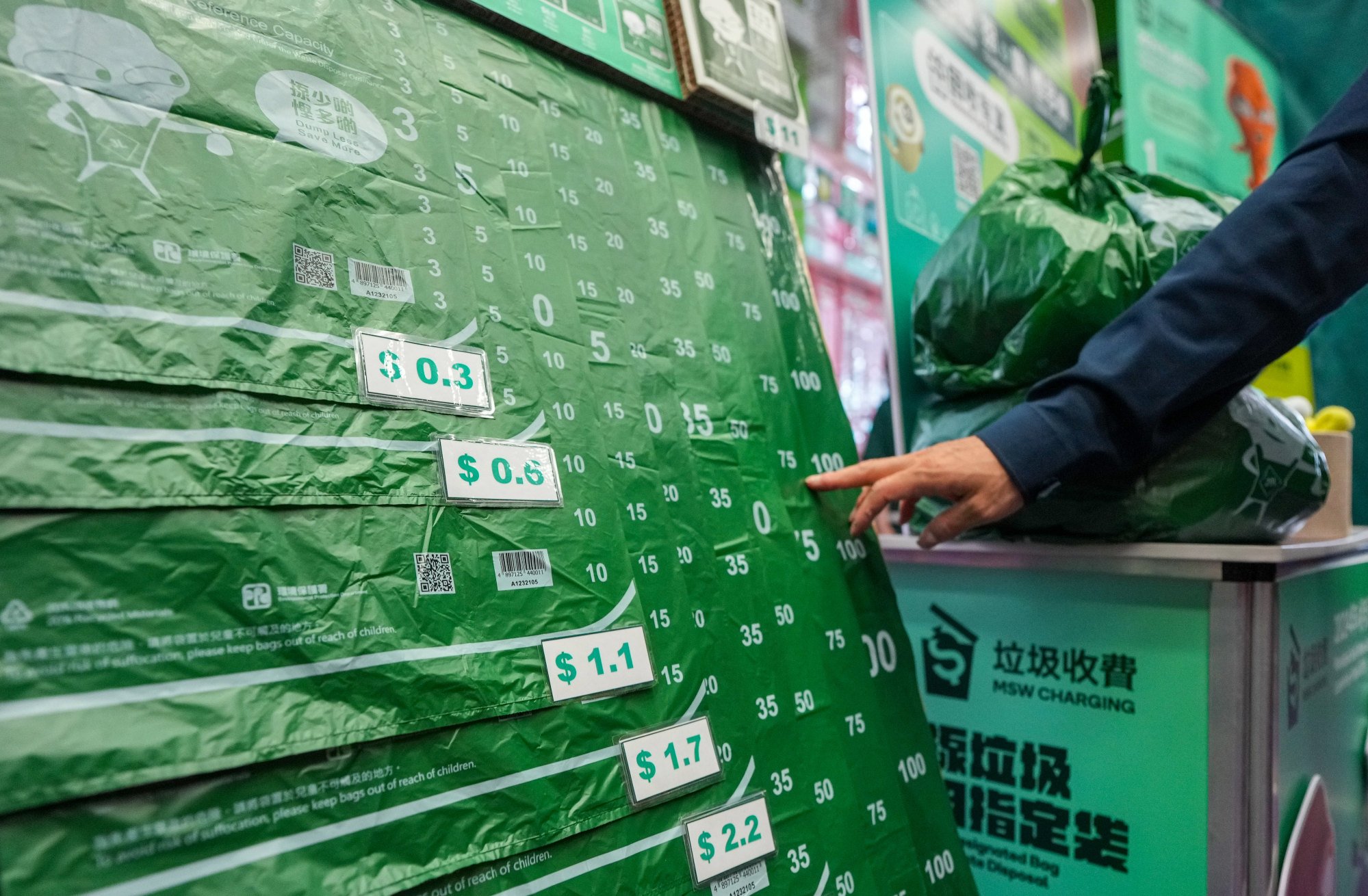
After waste-charging scheme is postponed, Hong Kong officials urged to clean up act, change tactics and get anxious public on board
- Pay-as-you-throw scheme is now set to begin on August 1 rather than April 1 following surprise postponement
- Cleaning firm owner says the message on the use of waste-disposal labels is ‘misleading’
Hong Kong authorities have been urged to use the four extra months before the city’s postponed waste-charging scheme comes into effect to convince an anxious public about its benefits, rather than drilling down on the details.
The pay-as-you-throw scheme is now set to begin on August 1 rather than April 1 following a surprise postponement on Friday after the city’s leader decided another delay was needed to better promote it amid public confusion.
Hong Kong delays waste charging to August as leader decides more education needed
Secretary for Environment and Ecology Tse Chin-wan on Saturday told a closed-door seminar that the government wanted more time because residents were not familiar with the execution details. He also pledged to review promotional efforts.
The scheme, first floated more than 20 years ago, aims to encourage people to recycle more and cut down on the amount of rubbish they throw out by requiring them to buy government-approved garbage bags, available in nine sizes, for 11 HK cents (1 US cent) per litre. Designated labels will also be sold for large or oddly sized items.

The current publicity campaign offers no shortage of videos explaining how the scheme works. Tse had said these videos had been played “thousands of times” when he defended promotional efforts in his blog on Tuesday.
In one social media video posted in December, singer-actor Louis Cheung tries to saw a chair into pieces and fit them into a designated bag, only to be called out by a cleaning lady who advised him to use an HK$11 label instead.
Cleaning firm owner Catherine Yan Sui-han argued that the message on the use of labels was “misleading” as large items collected at many housing estates would be charged by weight on trucks and residents were likely to share the costs as part of their management fees.
A mop and a pause on Hong Kong’s waste-charging scheme
“I’ve answered this question for so many people – unless you’re taking an item to a refuse collection point yourself, you won’t need a label,” said Yan, who is convenor of the Environmental Services Contractors Alliance.
Having been engaged by the authorities since September 2021 for the scheme, Yan said the industry had proposed at least seven rounds of edits to government guidelines, and was ready to cope with all garbage management options building owners could use under the charging scheme.
She said she hoped the authorities could make use of the extra time to get the right message across for the August launch.
“The government has not managed to reach a consensus with the people and convince them to accept garbage charges,” she said. “They are the ones who will be paying. If they are not clear about the scheme, they will be very reluctant and oppose it.”
While there was a consensus among the authorities and legislators that the government’s promotional efforts had been the weak link, Gary Zhang Xinyu, a member of the legislature’s environmental affairs panel, said officials must look beyond the execution details to fix the narrative problem.
Official views differ on strength of Hong Kong waste-charging publicity efforts
One unfortunate coincidence, he said, was that when many people became aware of the waste-charging arrangements this month, Financial Secretary Paul Chan Mo-po had also openly suggested fee increases to tackle the public deficit ahead of the budget.
“A more fundamental issue is that there are simply no buy-ins of the policy from many residents,” he said.
“Many people now think the government is doing this to increase income by raising a ‘garbage levy’. But does this actually help the environment? They can’t see the connection.”

He suggested that instead of fixating on the execution details, authorities should talk more about waste-reduction ideas and ways to improve access to recycling facilities, where many oddly sized items were not only collected for free, “but can even earn reward points”.
Emeritus Professor John Burns of the University of Hong Kong’s public administration department said officials also needed to restructure the preparation set-up to win the people’s approval for a policy that required a whole-of-government approach to work.
“The most important thing is for the government to make implementation of this policy a high priority, which the government has failed to do so far,” he said.
“High priority would mean top – level attention to coordinate the key players and message the public.”
What you need to know about Hong Kong’s coming waste-charging scheme
There are signs of changes. Home affairs chief Alice Mak Mei-kuen promised on Saturday that district councils and care teams would help residents know better about the scheme and recycling support.
Burns agreed the all-out efforts to promote last month’s “patriots-only” district council election showed some “partial mobilisational capacity” when a policy was high priority, but he cautioned the waste-charging scheme would require “much more” from the government to get it ready for prime time.
“The government must engage every resident in Hong Kong, not just patriots and the government departments charged with implementing the now routinised local elections,” he said. “Even then the IT system crashed during the election.”

